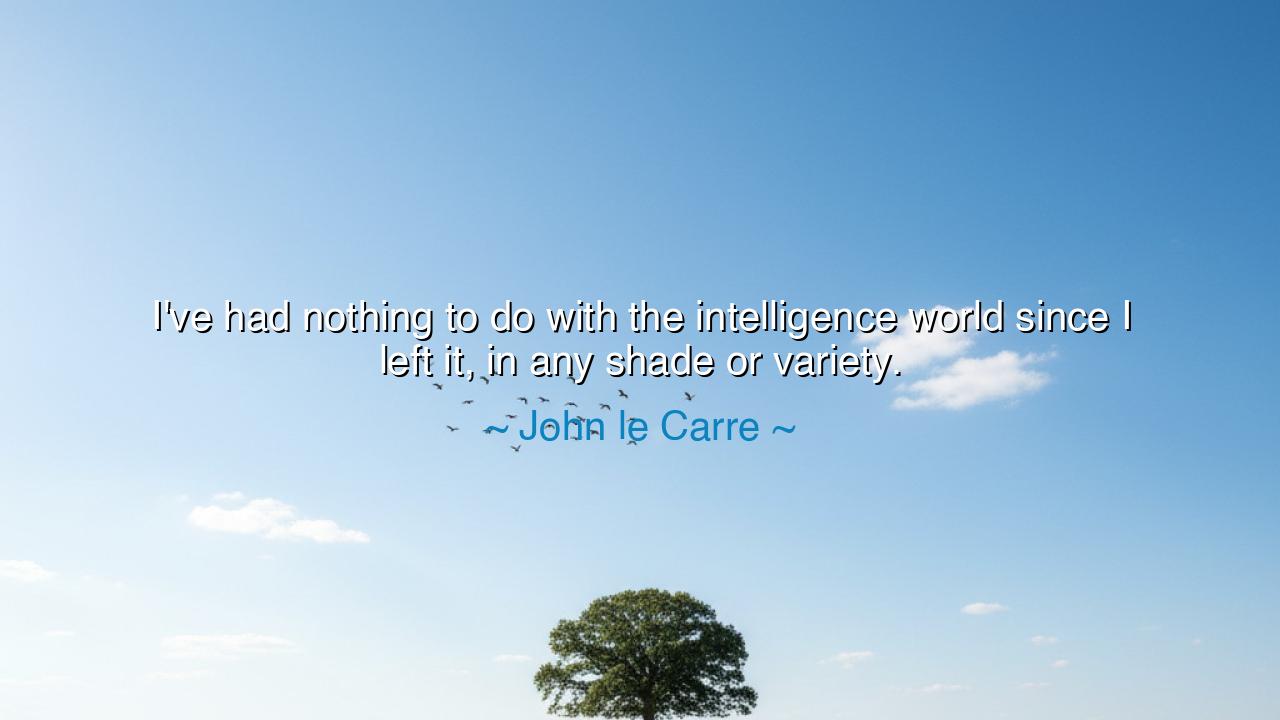
I've had nothing to do with the intelligence world since I left
I've had nothing to do with the intelligence world since I left it, in any shade or variety.






In the poignant words of John le Carré, "I've had nothing to do with the intelligence world since I left it, in any shade or variety," we are invited into a reflection on the nature of loyalty, identity, and the complexity of one's relationship to a past filled with shadows and secrets. Le Carré, himself a former MI5 and MI6 agent, offers a rare insight into the world of espionage—a world that is often murky and full of moral ambiguities. His decision to distance himself from the intelligence world speaks not only to the personal cost of living within such a secretive realm but also to the profound transformation that can occur when one leaves behind a life built on deception and subterfuge.
The act of leaving the world of intelligence and rejecting its influence is not one without historical precedent. In the ancient world, there were many who chose to forsake their roles in military or political spheres to pursue a life of philosophical or artistic reflection. Take, for example, Socrates, who, despite being born into a society that valued military prowess and political power, chose to abandon any aspiration to wield power himself. Instead, he sought to teach others the importance of virtue and truth through philosophical inquiry. Socrates’ decision to disengage from the political and military world, to live a life apart from the machinations of the state, echoes Le Carré’s rejection of the intelligence world—both men choosing instead to focus on the truth rather than the deceit inherent in their former roles.
Consider the life of Cicero, the great Roman statesman and orator, who was deeply involved in the politics of his time yet chose, in the later years of his life, to distance himself from the corruption and intrigue of Roman politics. Cicero, unlike many of his peers, was driven by a desire to uphold justice and virtue in his speeches and writings. When the political climate became too rife with corruption, Cicero sought refuge in philosophy, in the search for moral clarity, and in the belief that the truth could serve as the foundation for a better society. Similarly, Le Carré, who once thrived in the world of intelligence, later turned his talents to writing novels that unveiled the darkness of espionage, choosing to expose the moral complexities of intelligence work through storytelling rather than participate in its secrecy. Both Cicero and Le Carré exemplify the transformative power of stepping away from systems that seek to use the truth for power, and instead choosing to pursue higher ideals.
Le Carré’s disavowal of his past life in intelligence also speaks to the moral dilemmas faced by those who are drawn into the shadows of espionage. In his novels, like The Spy Who Came in from the Cold and Tinker Tailor Soldier Spy, Le Carré deftly explores the conflict between duty and personal morality, between the collateral damage of covert operations and the human cost of intelligence work. His characters often find themselves trapped between the demands of service and the ethical compromises they must make to survive. Le Carré’s distancing from the intelligence community can thus be seen as both a personal and philosophical stance—a rejection of a world that demands moral compromise in exchange for loyalty to the state. His life and writings become a reflection on the price of such loyalty and the internal costs of living a life built on deceit.
The lesson in Le Carré’s words is one of integrity and the recognition that truth must always be valued over loyalty to any system that sacrifices moral principles for expediency. While espionage and intelligence work may serve a greater purpose in protecting a nation or its interests, the very nature of such work often leads to the erosion of personal morality. Le Carré’s decision to distance himself from the intelligence community highlights the need to maintain personal ethics, even when faced with a society that may demand compromise. To live a life of honesty and virtue is a difficult, but ultimately rewarding path—one that requires the courage to abandon what we know, to reject falsehoods, and to embrace the truth, no matter the cost.
In practical terms, we can learn from Le Carré’s journey by examining our own relationships with systems of power, authority, and truth. Are there areas of our lives where we have been complicit in falsehoods or have sacrificed our own moral compass for convenience? The challenge, then, is to examine these areas and determine whether our loyalty to a particular system is worth the personal cost. Like Le Carré, we may find that stepping away from certain systems of power, though difficult, may offer the freedom to pursue a life grounded in truth, integrity, and authenticity.
Thus, Le Carré’s words are a call to reflect on the complex relationship between truth, loyalty, and morality in our own lives. Just as Socrates and Cicero sought to distance themselves from the corruption of their times, so too must we be vigilant in guarding our own integrity. The pursuit of truth should be the foundation upon which we build our lives, for it is only by living authentically that we can achieve the true freedom that comes from knowing ourselves and standing by our values.






AAdministratorAdministrator
Welcome, honored guests. Please leave a comment, we will respond soon